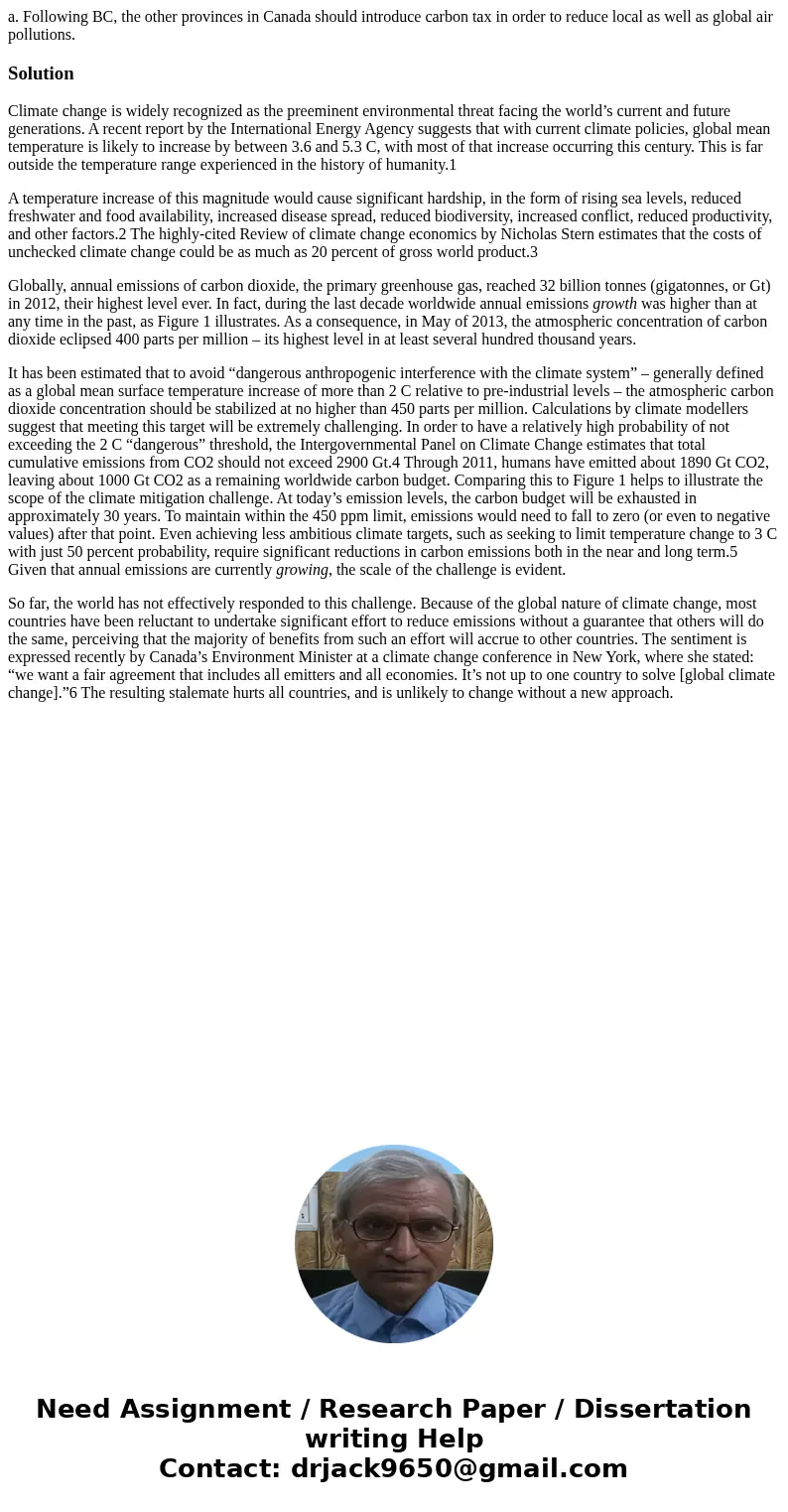a Following BC the other provinces in Canada should introduc
a. Following BC, the other provinces in Canada should introduce carbon tax in order to reduce local as well as global air pollutions.
Solution
Climate change is widely recognized as the preeminent environmental threat facing the world’s current and future generations. A recent report by the International Energy Agency suggests that with current climate policies, global mean temperature is likely to increase by between 3.6 and 5.3 C, with most of that increase occurring this century. This is far outside the temperature range experienced in the history of humanity.1
A temperature increase of this magnitude would cause significant hardship, in the form of rising sea levels, reduced freshwater and food availability, increased disease spread, reduced biodiversity, increased conflict, reduced productivity, and other factors.2 The highly-cited Review of climate change economics by Nicholas Stern estimates that the costs of unchecked climate change could be as much as 20 percent of gross world product.3
Globally, annual emissions of carbon dioxide, the primary greenhouse gas, reached 32 billion tonnes (gigatonnes, or Gt) in 2012, their highest level ever. In fact, during the last decade worldwide annual emissions growth was higher than at any time in the past, as Figure 1 illustrates. As a consequence, in May of 2013, the atmospheric concentration of carbon dioxide eclipsed 400 parts per million – its highest level in at least several hundred thousand years.
It has been estimated that to avoid “dangerous anthropogenic interference with the climate system” – generally defined as a global mean surface temperature increase of more than 2 C relative to pre-industrial levels – the atmospheric carbon dioxide concentration should be stabilized at no higher than 450 parts per million. Calculations by climate modellers suggest that meeting this target will be extremely challenging. In order to have a relatively high probability of not exceeding the 2 C “dangerous” threshold, the Intergovernmental Panel on Climate Change estimates that total cumulative emissions from CO2 should not exceed 2900 Gt.4 Through 2011, humans have emitted about 1890 Gt CO2, leaving about 1000 Gt CO2 as a remaining worldwide carbon budget. Comparing this to Figure 1 helps to illustrate the scope of the climate mitigation challenge. At today’s emission levels, the carbon budget will be exhausted in approximately 30 years. To maintain within the 450 ppm limit, emissions would need to fall to zero (or even to negative values) after that point. Even achieving less ambitious climate targets, such as seeking to limit temperature change to 3 C with just 50 percent probability, require significant reductions in carbon emissions both in the near and long term.5 Given that annual emissions are currently growing, the scale of the challenge is evident.
So far, the world has not effectively responded to this challenge. Because of the global nature of climate change, most countries have been reluctant to undertake significant effort to reduce emissions without a guarantee that others will do the same, perceiving that the majority of benefits from such an effort will accrue to other countries. The sentiment is expressed recently by Canada’s Environment Minister at a climate change conference in New York, where she stated: “we want a fair agreement that includes all emitters and all economies. It’s not up to one country to solve [global climate change].”6 The resulting stalemate hurts all countries, and is unlikely to change without a new approach.

 Homework Sourse
Homework Sourse